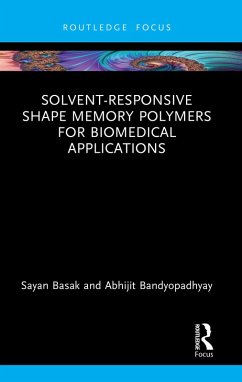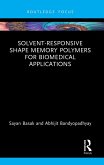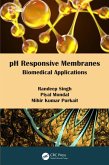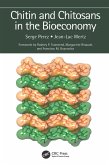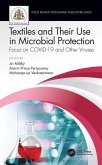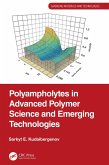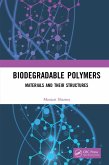Sayan Basak, Abhijit Bandyopadhyay
Solvent-Responsive Shape Memory Polymers for Biomedical Applications (eBook, PDF)
22,95 €
22,95 €
inkl. MwSt.
Sofort per Download lieferbar

11 °P sammeln
22,95 €
Als Download kaufen

22,95 €
inkl. MwSt.
Sofort per Download lieferbar

11 °P sammeln
Jetzt verschenken
Alle Infos zum eBook verschenken
22,95 €
inkl. MwSt.
Sofort per Download lieferbar
Alle Infos zum eBook verschenken

11 °P sammeln
Sayan Basak, Abhijit Bandyopadhyay
Solvent-Responsive Shape Memory Polymers for Biomedical Applications (eBook, PDF)
- Format: PDF
- Merkliste
- Auf die Merkliste
- Bewerten Bewerten
- Teilen
- Produkt teilen
- Produkterinnerung
- Produkterinnerung

Bitte loggen Sie sich zunächst in Ihr Kundenkonto ein oder registrieren Sie sich bei
bücher.de, um das eBook-Abo tolino select nutzen zu können.
Hier können Sie sich einloggen
Hier können Sie sich einloggen
Sie sind bereits eingeloggt. Klicken Sie auf 2. tolino select Abo, um fortzufahren.

Bitte loggen Sie sich zunächst in Ihr Kundenkonto ein oder registrieren Sie sich bei bücher.de, um das eBook-Abo tolino select nutzen zu können.
This book explains the intricacies of one-way shape memory polymers (SMPs), with a particular emphasis on solvent responsive SMPs focussing on fundamental pathways and key principles crucial to the development of these materials. It explains how solvent responsive SMPs addresses challenges and advancements within the biomedical industry.
- Geräte: PC
- mit Kopierschutz
- eBook Hilfe
- Größe: 6.65MB
Andere Kunden interessierten sich auch für
![Solvent-Responsive Shape Memory Polymers for Biomedical Applications (eBook, ePUB) Solvent-Responsive Shape Memory Polymers for Biomedical Applications (eBook, ePUB)]() Sayan BasakSolvent-Responsive Shape Memory Polymers for Biomedical Applications (eBook, ePUB)22,95 €
Sayan BasakSolvent-Responsive Shape Memory Polymers for Biomedical Applications (eBook, ePUB)22,95 €![pH Responsive Membranes (eBook, PDF) pH Responsive Membranes (eBook, PDF)]() Randeep SinghpH Responsive Membranes (eBook, PDF)46,95 €
Randeep SinghpH Responsive Membranes (eBook, PDF)46,95 €![Chitin and Chitosans in the Bioeconomy (eBook, PDF) Chitin and Chitosans in the Bioeconomy (eBook, PDF)]() Serge PerezChitin and Chitosans in the Bioeconomy (eBook, PDF)47,95 €
Serge PerezChitin and Chitosans in the Bioeconomy (eBook, PDF)47,95 €![Textiles and Their Use in Microbial Protection (eBook, PDF) Textiles and Their Use in Microbial Protection (eBook, PDF)]() Textiles and Their Use in Microbial Protection (eBook, PDF)93,95 €
Textiles and Their Use in Microbial Protection (eBook, PDF)93,95 €![Polymer Electrolytes for Energy Storage Devices (eBook, PDF) Polymer Electrolytes for Energy Storage Devices (eBook, PDF)]() Polymer Electrolytes for Energy Storage Devices (eBook, PDF)50,95 €
Polymer Electrolytes for Energy Storage Devices (eBook, PDF)50,95 €![Polyampholytes in Advanced Polymer Science and Emerging Technologies (eBook, PDF) Polyampholytes in Advanced Polymer Science and Emerging Technologies (eBook, PDF)]() Sarkyt E. KudaibergenovPolyampholytes in Advanced Polymer Science and Emerging Technologies (eBook, PDF)170,95 €
Sarkyt E. KudaibergenovPolyampholytes in Advanced Polymer Science and Emerging Technologies (eBook, PDF)170,95 €![Biodegradable Polymers (eBook, PDF) Biodegradable Polymers (eBook, PDF)]() Manjari SharmaBiodegradable Polymers (eBook, PDF)54,95 €
Manjari SharmaBiodegradable Polymers (eBook, PDF)54,95 €-
-
-
This book explains the intricacies of one-way shape memory polymers (SMPs), with a particular emphasis on solvent responsive SMPs focussing on fundamental pathways and key principles crucial to the development of these materials. It explains how solvent responsive SMPs addresses challenges and advancements within the biomedical industry.
Hinweis: Dieser Artikel kann nur an eine deutsche Lieferadresse ausgeliefert werden.
Dieser Download kann aus rechtlichen Gründen nur mit Rechnungsadresse in A, B, BG, CY, CZ, D, DK, EW, E, FIN, F, GR, HR, H, IRL, I, LT, L, LR, M, NL, PL, P, R, S, SLO, SK ausgeliefert werden.
Hinweis: Dieser Artikel kann nur an eine deutsche Lieferadresse ausgeliefert werden.
Produktdetails
- Produktdetails
- Verlag: Taylor & Francis eBooks
- Seitenzahl: 146
- Erscheinungstermin: 10. Dezember 2024
- Englisch
- ISBN-13: 9781040310458
- Artikelnr.: 72246793
- Verlag: Taylor & Francis eBooks
- Seitenzahl: 146
- Erscheinungstermin: 10. Dezember 2024
- Englisch
- ISBN-13: 9781040310458
- Artikelnr.: 72246793
- Herstellerkennzeichnung Die Herstellerinformationen sind derzeit nicht verfügbar.
Dr, Abhijit Bandyopadhyay is currently a full Professor in the Department of Polymer Science & Technology at University of Calcutta, and a Member of the Senate of the University. Additionally, he is also acting as the Technical Director of South Asia Rubber and Polymers Park, West Bengal. Dr. Bandyopadhyay is the former Head of the Department and the member of the Syndicate of this University. He is a National Scholar, has received Young Scientist Award in 2005 from Material Research Society of India, Kolkata Chapter and Career Award for Young Teachers in 2010 from Govt. of India for his contribution in teaching and research in various domains of polymer and rubber science and technology. He has published more than 110 research papers in reputed international journals, authored 5 books, filed two Indian patents and delivered several Plenary, Keynote and Invited lectures in International and National conferences and Faculty Development Programs. He has authored six books so far. He has also done both Government and Industry sponsored research projects and offered Industrial consultancies regarding development of several products. He has supervised 12 research students so far for obtaining their Doctorate degree and 10 more are currently doing their research under his supervision. He is the life member of Society of Polymer Science (SPS) and Indian Rubber Institute (IRI) and Associate Member of Indian Institute of Chemical Engineers (IICHE). He is also connected to All India Rubber Industries Association, Eastern Region (AIRIA, ER) and Indian Plastics Institute (IPI). His research interests include polymer blends and composites, polymer nanocomposites, hyperbranched polymers and polymer 3D printing.
Dr. Sayan Basak completed his B.Tech. in Polymer Science and Technology at the University of Calcutta (India) and earned his Ph.D. from the University of Akron, USA, specializing in smart polymers. His research focused on shape memory and functional polymers, aligning with his undergraduate studies. Post his Ph.D., he worked with Biocon India, where he worked with living ionic polymerization. He is currently an ETH domain research fellow at the Swiss Federal Laboratories for Materials Science and Technology (Empa, Eidgenössische Materialprüfungs- und Forschungsanstalt), Switzerland, focusing on catalytic polymerization and chemical reactor engineering. Dr. Basak remains a prominent collaborator of the Bandyopadhyay Lab at the University of Calcutta. He collaborates in the domains of polymer chemistry, polymer physics, and polymer structure property relationships.
Dr. Sayan Basak completed his B.Tech. in Polymer Science and Technology at the University of Calcutta (India) and earned his Ph.D. from the University of Akron, USA, specializing in smart polymers. His research focused on shape memory and functional polymers, aligning with his undergraduate studies. Post his Ph.D., he worked with Biocon India, where he worked with living ionic polymerization. He is currently an ETH domain research fellow at the Swiss Federal Laboratories for Materials Science and Technology (Empa, Eidgenössische Materialprüfungs- und Forschungsanstalt), Switzerland, focusing on catalytic polymerization and chemical reactor engineering. Dr. Basak remains a prominent collaborator of the Bandyopadhyay Lab at the University of Calcutta. He collaborates in the domains of polymer chemistry, polymer physics, and polymer structure property relationships.
1. Introduction to Shape Memory Polymers: Evolution, Growth, and Market
Size. 2. General Pathway for Designing (one-way) Shape Memory Polymers. 3.
Why are Solvent Responsive Shape Memory Polymers gaining interest in the
21st century? 4. Effect of Solvent Diffusion on the Shape Memory Process
and Shape Memory Efficacy of a solvent-excited shape memory polymer. 5.
Effects of Solvent on Thermomechanical Properties of solvent responsive
shape memory polymer. 6. Emerging Applications of solvent Responsive Shape
Memory Polymers in biomedical applications. 7. Exploring the
Structure-property relationships of solvent-responsive SMPs 8. Conclusions
and Future Outlook.
Size. 2. General Pathway for Designing (one-way) Shape Memory Polymers. 3.
Why are Solvent Responsive Shape Memory Polymers gaining interest in the
21st century? 4. Effect of Solvent Diffusion on the Shape Memory Process
and Shape Memory Efficacy of a solvent-excited shape memory polymer. 5.
Effects of Solvent on Thermomechanical Properties of solvent responsive
shape memory polymer. 6. Emerging Applications of solvent Responsive Shape
Memory Polymers in biomedical applications. 7. Exploring the
Structure-property relationships of solvent-responsive SMPs 8. Conclusions
and Future Outlook.
1. Introduction to Shape Memory Polymers: Evolution, Growth, and Market
Size. 2. General Pathway for Designing (one-way) Shape Memory Polymers. 3.
Why are Solvent Responsive Shape Memory Polymers gaining interest in the
21st century? 4. Effect of Solvent Diffusion on the Shape Memory Process
and Shape Memory Efficacy of a solvent-excited shape memory polymer. 5.
Effects of Solvent on Thermomechanical Properties of solvent responsive
shape memory polymer. 6. Emerging Applications of solvent Responsive Shape
Memory Polymers in biomedical applications. 7. Exploring the
Structure-property relationships of solvent-responsive SMPs 8. Conclusions
and Future Outlook.
Size. 2. General Pathway for Designing (one-way) Shape Memory Polymers. 3.
Why are Solvent Responsive Shape Memory Polymers gaining interest in the
21st century? 4. Effect of Solvent Diffusion on the Shape Memory Process
and Shape Memory Efficacy of a solvent-excited shape memory polymer. 5.
Effects of Solvent on Thermomechanical Properties of solvent responsive
shape memory polymer. 6. Emerging Applications of solvent Responsive Shape
Memory Polymers in biomedical applications. 7. Exploring the
Structure-property relationships of solvent-responsive SMPs 8. Conclusions
and Future Outlook.
